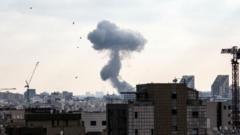Amid mounting military aggression, Iranian Supreme Leader Ayatollah Ali Khamenei must decide between a defensive response or further escalation.
Will Iran Choose Peace or Escalation in the Face of U.S. Pressure?

Will Iran Choose Peace or Escalation in the Face of U.S. Pressure?
Iran's response to escalating tensions with the U.S. and Israel raises questions about its leadership decisions.
June 22, 2025, 9:30 a.m. ET - The ongoing tensions between Iran and the United States, alongside Israel, have reached a critical juncture as Ayatollah Ali Khamenei contemplates a response to recent aggressive actions. Drawing parallels to 1988 when Ayatollah Ruhollah Khomeini reluctantly accepted a cease-fire with Iraq, Khamenei now faces a choice that could define his leadership and Iran’s future.
At age 86, Khamenei is contending with a precarious geopolitical landscape that could threaten the very existence of the Islamic Republic. Previously, Khomeini described accepting a cease-fire as akin to "drinking from a chalice of poison." However, Khamenei's historic tenure since 1989 has solidified Iran's standing as a regional power, complicating his decision-making.
In a defiant statement, Iran’s foreign ministry declared the nation's commitment to safeguarding its sovereignty and territorial integrity against what it described as U.S. "criminal aggression." Furthermore, Iran has already initiated missile strikes targeting Israel, signaling readiness to escalate military action. The looming possibility of attacks on American forces stationed in the vicinity remains a significant concern, as the geopolitical tensions threaten to spiral further.
As the world watches, the crucial question remains: will Khamenei opt for a negotiated peace to preserve the Islamic Republic, or choose to double down on confrontation, potentially leading to unprecedented consequences in the region?
At age 86, Khamenei is contending with a precarious geopolitical landscape that could threaten the very existence of the Islamic Republic. Previously, Khomeini described accepting a cease-fire as akin to "drinking from a chalice of poison." However, Khamenei's historic tenure since 1989 has solidified Iran's standing as a regional power, complicating his decision-making.
In a defiant statement, Iran’s foreign ministry declared the nation's commitment to safeguarding its sovereignty and territorial integrity against what it described as U.S. "criminal aggression." Furthermore, Iran has already initiated missile strikes targeting Israel, signaling readiness to escalate military action. The looming possibility of attacks on American forces stationed in the vicinity remains a significant concern, as the geopolitical tensions threaten to spiral further.
As the world watches, the crucial question remains: will Khamenei opt for a negotiated peace to preserve the Islamic Republic, or choose to double down on confrontation, potentially leading to unprecedented consequences in the region?























